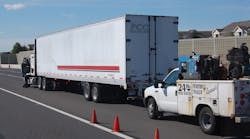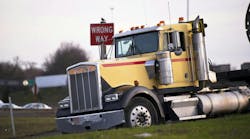The Compliance Safety Accountability (CSA) program implemented by the Federal Motor Carrier Safety Administration (FMCSA) nearly four years ago is driving a shift in focus but not necessarily an increase in maintenance within trucking, according to interviews with a variety of service providers.
The maintenance requirements have not truly changed under the CSA, just the management requirement and increased CSA inspections have changed,” David Pardue, VP of aftermarket business development for Mack Trucks, told Fleet Owner. “Keeping track of timely PM services and repairs will only assist with improved CSA scores and vehicle uptime.”
“CSA has not changed maintenance requirements, but it has placed a greater focus on adherence to those requirements,” added Terry Dubowick, national account lease manager for Volvo Truck Leasing System (VTLS). In his view, CSA is reinforcing the need to make proper vehicle maintenance and recording a priority for fleet managers.
Monica Truelsch, director of marketing for TMW Systems, added that CSA “has put the spotlight” on the entire maintenance process and extensive maintenance record keeping, leading fleets to re-evaluate the means they use to mitigate inspection risks and potential safety citations under CSA.
That’s why Michael Riemer, VP of products and channel marketing for Decisiv, Inc., believes fleet maintenance record-keeping practices and not necessarily maintenance volume itself needs to change the most in order to stay compliant with CSA.
“Since the Maintenance BASIC accounts for as much as 82% of CSA violations, shippers and others now have a clear view of how well you maintain your vehicles – and they will definitely steer clear of fleets with ugly maintenance records,” Reimer noted in a recent blog post.
“That’s why it’s more important than ever to have good process and systems in place to ensure regular inspections, high levels of PM compliance and timely completion of needed repairs,” he stressed. “Trying to stay on top of maintenance and repairs using a manual system or multiple non-integrated systems is almost certain to result in things slipping through the cracks.”
Though the reliability of CSA scores have been called into question, especially when it comes to CSA being a reliable predictor of crashes, is almost beside the point, Reimer emphasized.
“Whether or not the data is conclusive from a crash risk perspective, insurance companies, shippers, partners and customers are using them to make business decisions,” he pointed out.
That’s one reason why VTLS’ Dubowick believes that the expanding capabilities of connected truck technology holds tremendous promise for fleets in dealing with CSA issues as it will help better target “predictive repairs” while improving vehicle uptime.
“Connected vehicle technologies will help improve predictability, which in turn helps a fleet budget for vehicle maintenance,” he said.



